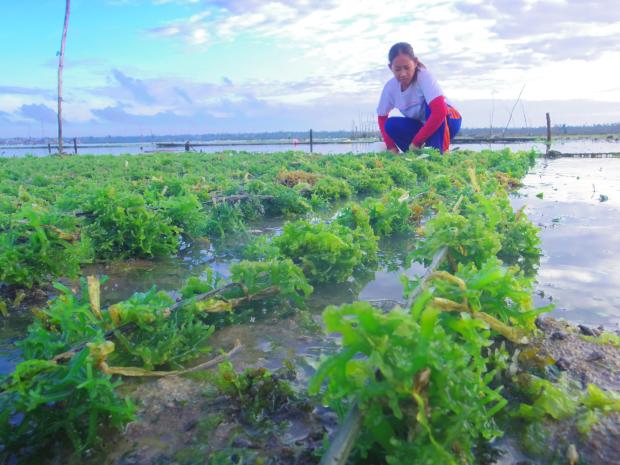
A seaweed farmer tends her new plot of seaweeds in Bantayan town, north of Cebu. Typhoon Yolanda swept all their investments away forcing them to start anew with the help of private donors. (CDN PHOTO/ MARIAN Z. CODILLA)
Help is on the way for seaweed farmers and fisherfolks in northern Cebu four months after supertyphoon Yolanda swept away their aquatic farms and fishing gears.
The Bureau of Fisheries and Aquatic Resources (BFAR)-7 turned over P33 million in monetary aid to the Cebu provincial government yesterday to rehabilitate aquatic farms and for other fisheries-related concerns in 16 towns and cities affected by the supertyphoon.
Around P15 million of the amount will be used for the purchase of seaweed seedlings, P10 million for the rehabilitation of the coastal farms and P6 million will be for the motorized bancas and fishing gear for fisherfolk families.
Cebu Gov. Hilario Davide and BFAR-7 Director Andres Bojos signed a memorandum of agreement weeks ago for the distribution of motorized bancas and fishing gear.
BFAR-7 will work with the Capitol and the municipal government units to identify beneficiaries and priority areas, Bojos said.
“We have to implement this immediately because we are in rehabilitation and under the fast track mode. There is no time for complacency here because we are trying to rebuild,” Bojos said at a ceremony at the Capitol yesterday.
According to Bojos, BFAR bought 250 new boats ready for distribution. The seaweed seedlings, he said, will be sourced from northern Mindanao and will be purchased in bulk.
Based on the damage assessment report of the Provincial Agriculturists Office, the province’s fisheries sector sustained more than P46.7 million worth of damage.
Earlier, Provincial Agriculturist Roldan Saragena said most of the affected aquatic farms were in Medellin, San Remigio, Daanbantayan and Lipayran island in Bantayan town.
Fish cages, fish pens, milkfish pens, mangroves, fishing gear, corals, artificial reefs and motorized boats owned by local fishermen were damaged by the rough waves brought about by Yolanda.
Other affected municipalities were Bantayan town, Sta. Fe and Madridejos in Bantayan Island, the towns of Pilar, Poro, San Francisco and Tudela in the Camotes group of islands, Tabuelan, Tuburan, Tabogon, Borbon, Sogod and Medellin.
Under the draft MOA, BFAR will implement the project with the province. This includes evaluation and procurement of materials, supervision of the operations and monitoring the project’s progress. The Capitol will give a 20-percent counterpart to cover administrative operations and other incidental expenses.
A committee will lead the project implementation. This will be composed by the governor, the BFAR regional director, the provincial agriculturist, provincial fisheries officer and municipal mayors.

